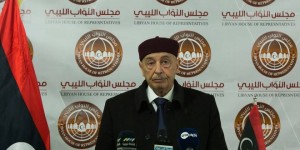By Moutaz Ali.

Tripoli, 24 August 2016.
Ageela Saleh has followed up the House of Representatives’ rejection of the second Government of National Accord line-up by demanding UN secretary-general Ban Ki-moon cease dealing with it and the Presidency Council. If Ban refuses, he has threatened to take the UN to the International Court of Justice.
The HoR president delivered his combative message via a letter handed over in New York by Ibrahim Dabashi, Libya’s much-fired UN ambassador, who still remains in post. Saleh’s argument is that without parliament’s approval of its ministers, the GNA cannot start functioning.
Yet almost immediately the US and the EU lined up behind the PC and the GNA. UNSMIL chief Martin Kobler insisted that under the Libyan Political Agreement, the two bodies were the sole executive authority in the country. He added that the GNA should continue to perform its duties until a vote of confidence was granted by the HoR.
Jonathan Winer, Washington’s special Libyan envoy said that December’s Security Council resolution backing the LPA and the PC remained in force. He warned that those who obstructed or undermined political transition must be held accountable. Ageela Saleh is already subject to UN sanctions on that very basis.
Saleh’s letter to Ban could be taken to read that he rejects the PC as well as the government ministers it nominated. It is not clear that parliament actually went that far in its vote. Until now, by simply considering and rejecting the two cabinets proposed by Faiez Serraj and his fellow PC members, it was assumed that legislators accepted the PC’s legitimacy.
UNSMIL has reportedly called back members of the Libyan Political Dialogue to Tunis in a fortnight’s time, to review the political stand-off. When this body last met in July, it was to warn Faiez Serraj about his poor performance in sorting out the power, security and cash crises. This failure has dissipated the general enthusiasm with which he was welcomed to Tripoli at the end of March.
The challenge for the Dialogue and their international supporters is that from the moment of its signing last December in Skirhat, it has always been emphasised that the LPA cannot be changed. Power was divided between the executive in the form of the PC and the GNA and the legislature of the HoR, with the State Council holding a largely advisory role. On paper, it looked then like a system with checks and balances. However, today it appears to be all checks and no balance.






